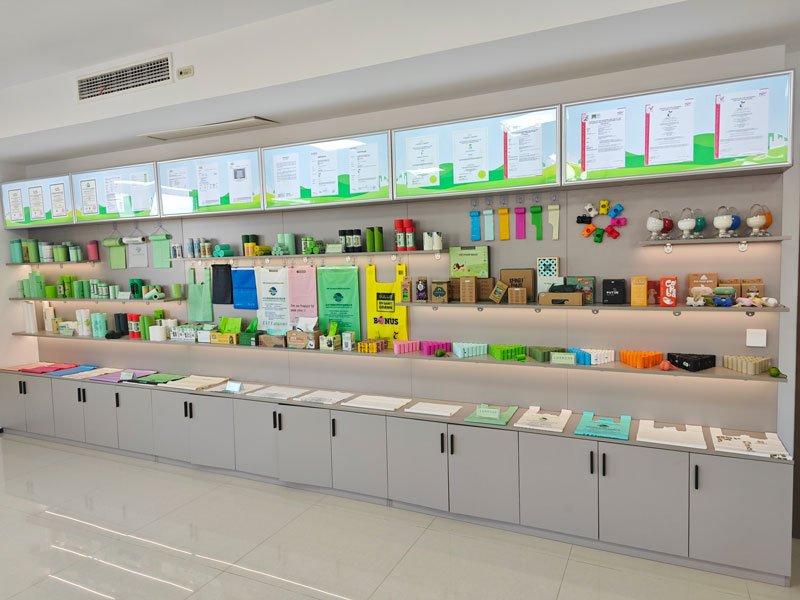When shopping for bags at the supermarket, have you ever seen labels like "compostable," "biodegradable," or "plant-based" printed on many packaging? We excitedly buy them home, only to find they're badly damaged and have a pungent odor. How should we choose from these vague marketing claims?
As a manufacturer with 16 years of experience in biodegradable and compostable bags, we'll delve into how to find the best eco-friendly trash bags and hope to help you.
What Makes Trash Bags so Eco-Friendly?
How can I be sure a bag is eco-friendly?
Certification Verification: Verify the authenticity of product certifications using the official databases of authoritative websites like BPI and TÜV AUSTRIA (OK compost HOME certification body).
Leakage Test: We fill each bag with 3 kg of moist food waste (a mixture of coffee grounds, fruit peels, and leftovers), hang it for 24 hours, and observe for leaks or tears.
Strength Test: We perform post-puncture or load-bearing tests.
Usability Assessment: Is the bag easy to tear from the roll? Is it easy to open and close?
What Do "Fake Eco-Friendly" Garbage Bags Look Like?
Greenwashing marketing traps include the following:
Bags labeled simply "biodegradable": Decomposition in oxygen-deprived landfills can take hundreds of years, releasing the greenhouse gas methane. However, there are no other certification standards.
"Oxo-degradable" bags: They simply break down plastic into countless invisible microplastics, causing significant damage to the soil and unsustainable development.
Any "eco/green" bag without third-party certification: If the product uses vague marketing claims but lacks any hard-core certification like BPI or OK Compost Home, disregard it.

Top 10 Best Eco Friendly Trash Bags for 2025
1. Glad Compostable Trash Bags
- Key Features: Made from plant-based PLA, 13-gallon capacity, BPI-certified compostable, strong drawstring closure.
- Pros: Durable for kitchen waste, composts in industrial facilities, leak-proof.
- Cons: Slightly more expensive than regular bags.
- Price Range: $0.30–$0.40 per bag (available on Amazon, Walmart).
- User Feedback: 4.5/5 stars. Users love the strength but note they’re pricier than non-eco options.
2. Seventh Generation Recycled Trash Bags
- Key Features: 100% recycled plastic (60% post-consumer), 13-gallon, no added dyes or fragrances.
- Pros: Affordable, widely available, supports recycling programs.
- Cons: Not compostable, less eco-friendly than plant-based options.
- Price Range: $0.20–$0.30 per bag (Amazon, Target).
- User Feedback: 4.3/5 stars. Great for budget-conscious buyers, but some report occasional tearing.
3. BioBag Compostable Kitchen Bags
- Key Features: Made from GMO-free cornstarch, 3–13-gallon options, BPI-certified, ideal for food waste.
- Pros: Fully compostable, strong for wet waste, odor-resistant.
- Cons: Smaller sizes may not suit large households.
- Price Range: $0.35–$0.50 per bag (Amazon, Whole Foods).
- User Feedback: 4.6/5 stars. Customers praise compostability but want larger sizes.
4. UNNI Compostable Trash Bags
- Key Features: Plant-based, BPI and OK Compost certified, 4–30-gallon sizes, tear-resistant.
- Pros: Wide size range, great for home or commercial composting.
- Cons: Higher cost for larger sizes.
- Price Range: $0.25–$0.45 per bag (Amazon, UNNI website).
- User Feedback: 4.4/5 stars. Users like the versatility but note the price.
5. HoldOn Compostable Trash Bags
- Key Features: Home-compostable, made from plant starch, 4–13-gallon, BPI-certified.
- Pros: Breaks down in home compost, sturdy for everyday use.
- Cons: Limited availability in stores.
- Price Range: $0.40–$0.60 per bag (Amazon, HoldOn website).
- User Feedback: 4.5/5 stars. Popular for eco-conscious users, but some find it pricey.
6. Simplehuman Compostable Trash Bags
- Key Features: PLA and starch blend, fits Simplehuman cans (4–13-gallon), BPI-certified.
- Pros: Perfect fit for branded cans, strong and leak-proof.
- Cons: Designed for specific bins, higher cost.
- Price Range: $0.50–$0.70 per bag (Amazon, Simplehuman).
- User Feedback: 4.7/5 stars. Great for Simplehuman users, but not universal.
7. Green Earth Compostable Bags
- Key Features: Cornstarch-based, 13–33-gallon, BPI-certified, heavy-duty.
- Pros: Ideal for large households or outdoor use, durable.
- Cons: Less flexible for small bins.
- Price Range: $0.30–$0.50 per bag (Amazon, Walmart).
- User Feedback: 4.3/5 stars. Strong for heavy waste, but some dislike the texture.
8. Stout by Envision EcoSafe Bags
- Key Features: 64% recycled plastic, 13–45-gallon, ASTM D6400 compliant.
- Pros: Great for commercial use, eco-friendly without sacrificing strength.
- Cons: Not fully compostable.
- Price Range: $0.25–$0.40 per bag (Amazon, industrial suppliers).
- User Feedback: 4.4/5 stars. Reliable for businesses, but less known for home use.
9. Hippo Sak Plant-Based Bags
- Key Features: Made from sugarcane, 13-gallon, puncture-resistant, no certifications.
- Pros: Affordable, strong for kitchen waste.
- Cons: Lacks official eco-certifications.
- Price Range: $0.20–$0.35 per bag (Amazon, Walmart).
- User Feedback: 4.2/5 stars. Budget-friendly, but some question eco-claims.
10. For Good Compostable Bags
- Key Features: PLA-based, 3–13-gallon, BPI-certified, designed for small households.
- Pros: Great for apartments, fully compostable.
- Cons: Limited size options.
- Price Range: $0.30–$0.45 per bag (Amazon, For Good website).
- User Feedback: 4.5/5 stars. Perfect for small spaces, but not for heavy waste.
Note: Prices may vary based on retailer and pack size. Check links for the latest deals.
| Brand/Product | Material | Capacity | Certifications | Price per Bag | Best For |
|---|---|---|---|---|---|
| Glad Compostable | PLA | 13-gal | BPI | $0.30–$0.40 | Kitchen |
| Seventh Generation | Recycled Plastic | 13-gal | None | $0.20–$0.30 | Budget |
| BioBag | Cornstarch | 3–13-gal | BPI, OK Compost | $0.35–$0.50 | Food Waste |
| UNNI | Plant-Based | 4–30-gal | BPI, OK Compost | $0.25–$0.45 | Versatility |
| HoldOn | Plant Starch | 4–13-gal | BPI | $0.40–$0.60 | Home Compost |
| Simplehuman | PLA/Starch | 4–13-gal | BPI | $0.50–$0.70 | Simplehuman Bins |
| Green Earth | Cornstarch | 13–33-gal | BPI | $0.30–$0.50 | Heavy-Duty |
| Stout EcoSafe | Recycled Plastic | 13–45-gal | ASTM D6400 | $0.25–$0.40 | Commercial |
| Hippo Sak | Sugarcane | 13-gal | None | $0.20–$0.35 | Budget |
| For Good | PLA | 3–13-gal | BPI | $0.30–$0.45 | Small Households |
This table helps you quickly compare options based on your needs, whether it’s budget, composting, or heavy-duty use.
How to Choose the Right Eco-Friendly Trash Bag
Choosing the best eco-friendly trash bags ultimately depends on how they will be disposed of after use. Common options include composting at a government-run industrial composting facility, composting at home, or incineration.
- Municipal Composting System
If your city provides dedicated food waste/wet waste collection and sends it to an industrial composting plant,then it's best to choose a BPI-certified product, such as UNNI or BioBag.
- Home Compost Bin
If you plan to compost in your own backyard,the best option is to look for a product with the OK Compost Home certification, such as UNNI or BioBag.
- Landfill or Incinerator
If your waste will be landfilled or incinerated,The truly "best eco-friendly bag" is one containing "high post-consumer recycled content."
Compostable bags won't break down effectively if incinerated, making them less environmentally friendly. Choosing PCR bags made from recycled plastic is a more effective way to directly reduce the amount of plastic waste and promote a circular economy. Seventh Generation or Glad high PCR content series products.

Why Are Eco Friendly Trash Bag so Expensive?
"Cost per bag" vs. "Cost of failure": If a $0.15 bag leaks, how much does it cost you to clean the floor and the "cost of failure" of using a new bag? Sometimes, choosing a $0.20, but absolutely reliable bag can actually save you money.
When you buy a certified reusable bag, the extra money you pay actually contributes to more sustainable agriculture (for corn starch production), the bag's production process, a future less reliant on oil, supports government environmental policies, and, most importantly, contributes to a sustainable, healthy, and environmentally friendly planet.
Conclusion:
No single brand is the absolute "best" choice. The best reusable trash bag isn't the most expensive or the most reputable, but rather the one that best suits your household's trash disposal needs and meets your daily needs. Hopefully, this article will help you find the best reusable trash bags.
Related articles
- Best Biodegradable Garbage Bags in 2025(Eco-Friendly & Affordable)
- 2025 Best Compostable Trash Bags for an Eco-Friendly Home
Source;





